期人教版英语八年级下册导学案:unit 9 Section B(1a1d)
人教版八年级英语下unit9(Section A 1a-2d)导学案
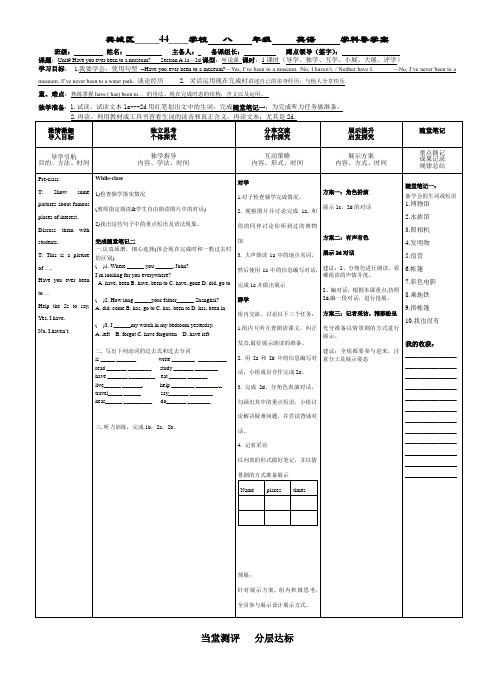
樊城区_____44____学校八年级英语学科导学案班级:姓名:主备人:备课组长:蹲点领导(签字):课题:Unit9 Have you ever been to a museum? Section A 1a—2d课型:听说课课时:1课时(导学、独学、互学、小展、大展、评学)学习目标: 1.我要学会,使用句型--Have you ever been to a museum?—Yes, I’ve been to a museum. /No, I haven’t. / Neither have I.—No, I’ve never been to a museum. /I’ve never been to a water park.谈论经历 2. 灵活运用现在完成时讲述自己的亲身经历,与他人分享快乐重、难点:熟练掌握have ( has) been to… 的用法。
现在完成时态的结构,含义以及运用。
独学准备:1.试读。
试读文本1a---2d用红笔划出文中的生词,完成随堂笔记一;为完成听力任务做准备。
__________read _______ ________have _______ _________live______ _______help ________ _________do_______ ________当堂测评分层达标基础落实★单项选择( ) 1、Have you met Mr. Li ______?A. just B. ago C.before D. a moment ago( )2、—Our country ______ a lot so far . —Yes . I hope it will be even ______ .A. has changed ; well B. changed ; good C. has changed ; better D. changed ; better( )3. _____ you ever _____ to an aquarium? Yes, we had a good time there.A. Have, goneB. Had, beenC. Have, been( ) 4. I_____ my grandpa last Sunday.A. have visitedB. visitedC. was visiting( ) 5. She _____ Shanghai for a month.A. has come toB. came toC. has been in( )6. Mr. Hu died last year. He ____for several months alredy.A. has been dyingB. has diedC. has been deadD. died( ) 7. Fanny _____ TV at this time last Saturday.A. has watchedB. was watchingC. watched( ) 8. Have you ____ been to our town before? No, it's the first time I ___ here.A. even, have comeB. ever, comeC. ever, have come( )9. May ______ the book for two weeks.A. borrowedB. lentC. keptD. bought( )10.Remembering these new words ________him a lot of time.A. costsB. spendsC. takes发展能力★★用所给词的适当形式填空。
八年级(下)英语学科导学案Unit9B

八年级(下)英语学科导学案Unit9Have you ever been to an amusement park?(Section B)教师寄语:Custom makes all things easy.有个好习惯,事事皆不难。
一、学习目标1) 单词与短语exchange student, attendant, flight attendant, discover, requirement,guide, tour guide2)目标句型:1. Where do you want to go?2. How long have you been doing…?3. What do you like best about doing sth.?4. What kind of job do you want?5. How do/did you do sth.?3) 语法现在完成时态。
二、教学重点和难点1.教学重点:现在完成时态。
2.教学难点:现在完成时态。
三、知识链接现在完成进行时态。
四、学法指导:通过小组合作学习,探究讨论,结合导学案及相关资料理解各知识点,掌握本节学习内容。
五、导学过程:1. 组长带领组员复习现在完成进行时。
2. 组长带领组员通读课本from page 71 to 72,理解其含义并完成表格。
3. 组长带领组员熟读3a课文,并指定课堂朗读人选。
4. 组长带领组员找出课本(from page 71 to 72)的重要短语、句子。
并指定课堂展示人选。
5. Language points:(一)have been to / have gone to区别1)have been to表示曾经去过某处,但现在人不在那了。
可以和次数连用。
I have been to Beijing. I went there last year.I have been to Shanghai twice.如遇到adv.(where, here, there, home, abroad)省略to.Have you ever been abroad?Where have you been?2)have gone to 已经去了某地,现在人可能在去的途中或返回途中,或已在那了。
英语人教版八年级下册Unit 9 (Section B 1a-1d)
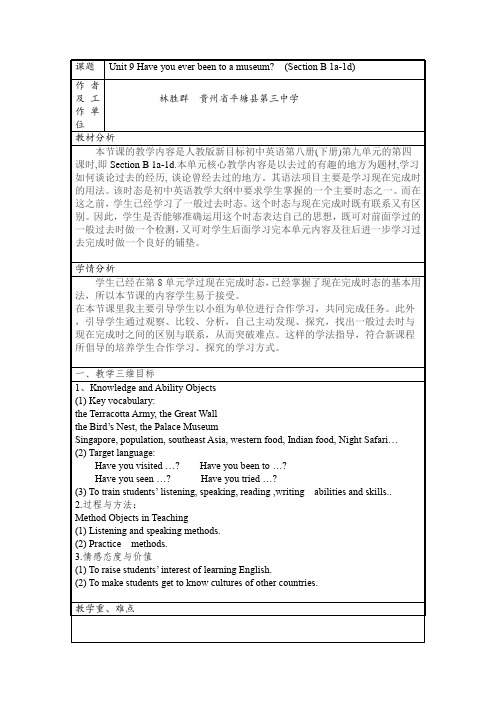
Step3、Lead-inStep4、Listen andfinish (1b 、1c 、)Step5、 SpeakingWork in pairs. (1d)1. Look at the pictures and review thesentencepattern:Have you ever been to\seen\visited\tried …? 2.2.Ask the to dril3. Finish exercise 1a on textbook.Matchthe pictures with names.听录音完成1b 、1c 、检查学生答案。
给学生展示一遍听力课文。
让学生写下自己及本组其他同学曾经去过的有名的风景名胜,谈谈那里的气候特点,风土人情等等让学生以小组为单位在全班其他学生面前展示汇报to…? Yes, I have./No, I haven’t.学生完成1a学生完成1b ,1c学生以小组为单位互相向同伴介绍自己曾经去过的地方。
(提醒学生注意用准have 与has )之后完成表格选出几篇写得较好的学生作品,全班展示,并辅助以其相应的景色优美的图片,就像一个个导游在向游客锻炼学生听力。
让学生利用学过的句型来表达自己的思想,完成任务,充分体现了任务型教学途径的原则。
激发起学生们了解世界,了解大自然的欲望,进而更加热爱大自然,热爱生活。
学生不但懂得运用一般过去时、现在完成时表述自己的思想,而且也懂得正确使用助动词have 与has 。
达到了突破难点的目的有始有终,前呼后应Step6、 ExercisesStep7、Review and SummaryStep8、Giving areport of each group.自己的成果。
She/He went to….She/He has been to….让学生完成练习What have we learnt this class?看哪组表现良好。
人教新目标版八年级英语下册导学案第九单元(含答案)
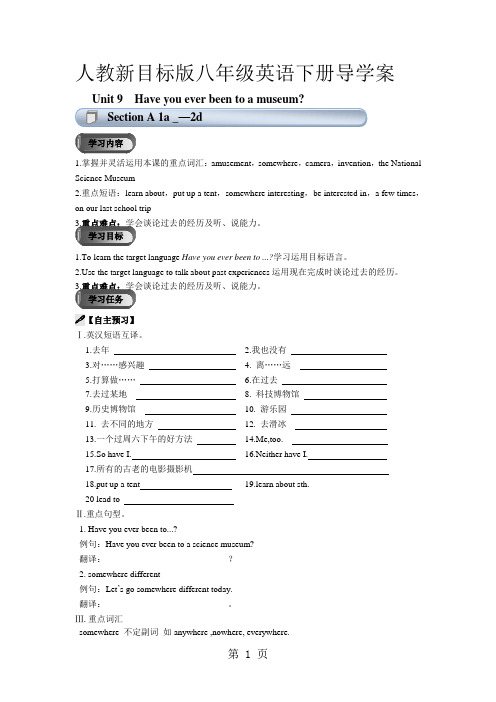
人教新目标版八年级英语下册导学案 Unit 9 Have you ever been to a museum?1.掌握并灵活运用本课的重点词汇:amusement ,somewhere ,camera ,invention ,the National Science Museum2.重点短语:learn about ,put up a tent ,somewhere interesting ,be interested in ,a few times ,on our last school trip3.重点难点:学会谈论过去的经历及听、说能力。
1.To learn the target language Have you ever been to ...?学习运用目标语言。
e the target language to talk about past experiences 运用现在完成时谈论过去的经历。
3.重点难点:学会谈论过去的经历及听、说能力。
✂【自主预习】Ⅰ.英汉短语互译。
1.去年2.我也没有3.对……感兴趣4. 离……远5.打算做……6.在过去7.去过某地 8. 科技博物馆9.历史博物馆 10. 游乐园11. 去不同的地方 12. 去滑冰13.一个过周六下午的好方法 14.Me,too.15.So have I. 16.Neither have I.17.所有的古老的电影摄影机18.put up a tent 19.learn about sth.__________________20 lead toⅡ.重点句型。
1. Have you ever been to...?例句:Have you ever been to a science museum?翻译:____________________________?2. somewhere different例句:Let ’s go somewhere different today.翻译:____________________________。
【人教版】八年级下册英语导学案:Unit 9 Section B(1a-1d)导学案
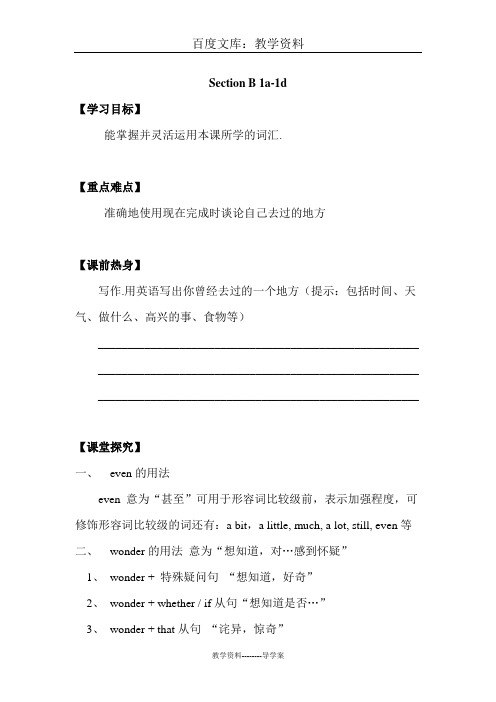
Section B 1a-1d【学习目标】能掌握并灵活运用本课所学的词汇.【重点难点】准确地使用现在完成时谈论自己去过的地方【课前热身】写作.用英语写出你曾经去过的一个地方(提示:包括时间、天气、做什么、高兴的事、食物等)_______________________________________________________ _______________________________________________________ _______________________________________________________【课堂探究】一、even的用法even 意为“甚至”可用于形容词比较级前,表示加强程度,可修饰形容词比较级的词还有:a bit,a little, much, a lot, still, even等二、wonder的用法意为“想知道,对…感到怀疑”1、wonder + 特殊疑问句“想知道,好奇”2、wonder + whether / if从句“想知道是否…”3、wonder + that从句“诧异,惊奇”三、辨析be able to与can1、be able to表示经过努力后获得的能力或能做某事,可用于将来时、完成时和过去时,时态较多.如:In the end,some of them were able to pass the exam.2、Can表示能做某事,不强调能力,只用于一般现在时及一般过去时.如:At home he can do what he wants.四、辨析with、by、in “用”1、with,多指使用某种工具或用身体的某个部位或器官来完成某项活动.如:He cut it open with a knife.2、by,指采用某种方法、手段,by doing sth.如:I learn English by asking the teacher for help.3、In,指使用某种语言、采用某种途径或选用某种材料等如:Can you sing this song in English?【当堂检测】一、用所给词的适当形式填空.1、He _____ (be) to the History Museum several times.2、--________ you ever _______ (be) to the zoo?--Yes, I________(go) there last summer. I ________ (see) many kinds of animals there.3.—Where is Mr. Wang?---He ______ (go) to the library. He wants to borrow some library books.4. Xiao Ming _____ (plant) those trees. He _________ (do) it the day before yesterday.5. We ______ (learn) English for more than two years.二、单项选择.1. How long have you been _____English?A. studyB. studiedC. studyingD. studyed2. He called me up when I ______a shower this morning.A. haveB. hadC. have hadD. was having3. I think Ann _____a supper star in only 2 years?A. isB. is going toC. is beingD. has been4. Have you ever ______to travel around?A. take a trainB. took trainC. by a trainD. by trains5. The kids from mountains districts _______ never _______ computer games before. They’re so excited.A. have; playedB. did; playC. are; playingD. do; play6. When I was fifteen years old, I got _____all kinds of stamps.A. to collectB. to collectingC. collectD. to7、I want to tell Mike about the thing. But he just ______ it.A. wasn’t interestedB.wasn’t interested inC. didn’t interestD. interested【教学反思】。
英语人教版八年级下册Unit9 Section B1a-1d教案
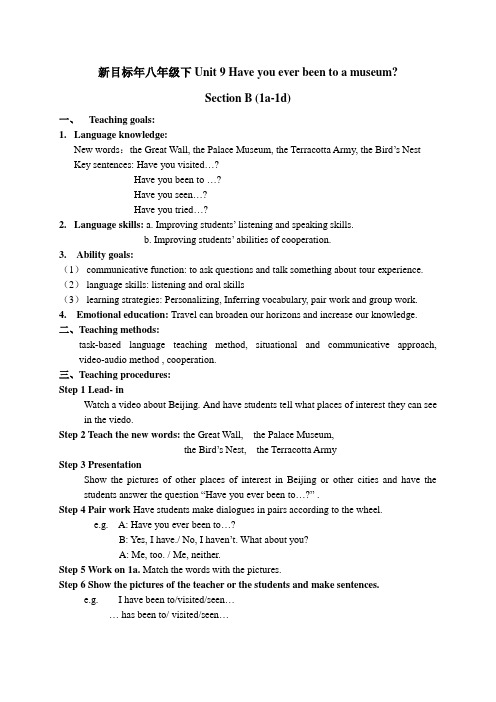
新目标年八年级下Unit 9 Have you ever been to a museum?Section B (1a-1d)一、Teaching goals:nguage knowledge:New words:the Great Wall, the Palace Museum, the Terracotta Army, the Bird’s Nest Key sentences: Have you visited…?Have you been to …?Have you seen…?Have you tried…?nguage skills: a. Improving students’ listening and speaking skills.b. Improving students’ abilities of cooperation.3. Ability goals:(1) communicative function: to ask questions and talk something about tour experience. (2) language skills: listening and oral skills(3) learning strategies: Personalizing, Inferring vocabulary, pair work and group work.4. Emotional education: Travel can broaden our horizons and increase our knowledge.二、Teaching methods:task-based language teaching method, situational and communicative approach, video-audio method , cooperation.三、Teaching procedures:Step 1 Lead- inWatch a video about Beijing. And have students tell what places of interest they can see in the viedo.Step 2 Teach the new words: the Great Wall, the Palace Museum,the Bird’s Nest, the Terracotta ArmyStep 3 PresentationShow the pictures of other places of interest in Beijing or other cities and have the students answer the question “Have you ever been to…?” .Step 4 Pair work Have students make dialogues in pairs according to the wheel.e.g. A: Have you ever been to…?B: Yes, I have./ No, I haven’t. What about you?A: Me, too. / Me, neither.Step 5 Work on 1a. Match the words with the pictures.Step 6Show the pictures of the teacher or the students and make sentences.e.g. I have been to/visited/seen…… has been to/ visited/seen…Step 7 Sentence ChainHave students tell the others what places of interest they have been to one by one.e.g: S1: S2: I have been to the West Lake.S2: S3:… has been to the West Lake. I have been to the Great Wall.S3: S4: … has been to the Great Wall. I have been to…S4: S5: … has been to …. I have been to…Step 8 Work on 1b listeningListen to a student interviewing a foreign student. Check (√) the questions you hear. Step 9 Work on 1c Listen again and take notes.Name: _________________Country: __________________How long in China: ________________________________Places visited: _____________________________________Food: ______________________Step 10 Have students read the tapescript.Step 11 Work on 1d Pair workHave students make dialogues using the sentences:Have you ever been to…?Have you ever visited…?Have you ever seen…Have you ever tried…?Step 12 Group work Do a surveyShow the pictures of Meizhou and have students interview the students or the teachers about their trip to the places of interest in Meizhou and make a report.Step 13 Emotional education: Travel can broaden our horizons and increase our knowledge. Step 14 Summary1.Places of interest:the Great Wall, the Summer Palace, the Terracotta Army, the Bird’s Nest2. Have you ever been to…?Have you ever visited…?Have you ever seen…?Have you ever tried…?Step 15 HomeworkWrite a passage about Meizhou.(Describe the people/location/the places ofinterest/food of Meizhou.)。
初中英语人教版八年级下册unit9SectionB1a1d优秀教学案例
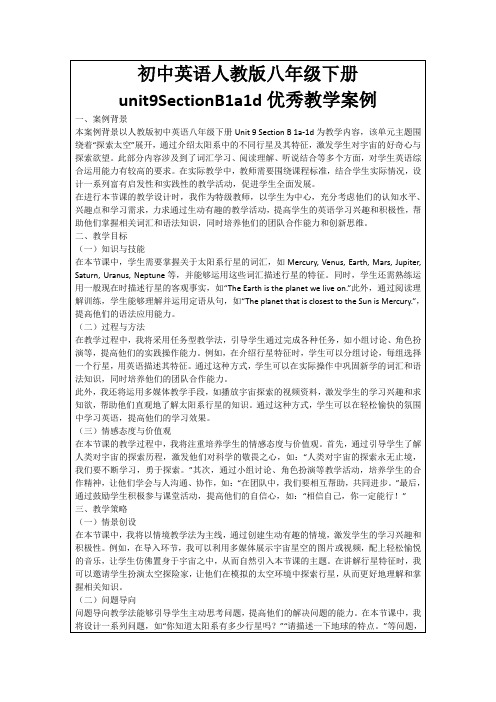
一、案例背景
本案例背景以人教版初中英语八年级下册Unit 9 Section B 1a-1d为教学内容,该单元主题围绕着“探索太空”展开,通过介绍太阳系中的不同行星及其特征,激发学生对宇宙的好奇心与探索欲望。此部分内容涉及到了词汇学习、阅读理解、听说结合等多个方面,对学生英语综合运用能力有较高的要求。在实际教学中,教师需要围绕课程标准,结合学生实际情况,设计一系列富有启发性和实践性的教学活动,促进学生全面发展。
(二)过程与方法
在教学过程中,我将采用任务型教学法,引导学生通过完成各种任务,如小组讨论、角色扮演等,提高他们的实践操作能力。例如,在介绍行星特征时,学生可以分组讨论,每组选择一个行星,用英语描述其特征。通过这种方式,学生可以在实际操作中巩固新学的词汇和语法知识,同时培养他们的团队合作能力。
此外,我还将运用多媒体教学手段,如播放宇宙探索的视频资料,激发学生的学习兴趣和求知欲,帮助他们直观地了解太阳系行星的知识。通过这种方式,学生可以在轻松愉快的氛围中学习英语,提高他们的学习效果。
(二)问题导向
问题导向教学法能够引导学生主动思考问题,提高他们的解决问题的能力。在本节课中,我将设计一系列问题,如“你知道太阳系有多少行星吗?”“请描述一下地球的特点。”等问题,让学生在回答问题的过程中,自然地学习和掌握相关知识。同时,我还会鼓励学生提出自己的问题,如:“为什么火星是红色的?”“木星有什么特殊的特征?”等,从而激发他们的求知欲和独立思考的能力。
(四)总结归纳
在总结归纳环节,我会邀请每个小组的代表汇报他们的讨论结果。我会鼓励学生们用简洁明了的语言表达他们的观点,例如:“Our group chose Mars. It is a red planet and it has a thin atmosphere.”在听完每个小组的汇报后,我会对他们的表现进行点评,指出他们的优点和需要改进的地方。同时,我会对所学知识进行归纳总结,例如:“Today we learned about the planets in the solar system and how to describe their characteristics using the present tense.”
人教版英语八年级下册 Unit 9 导学案

Unit 9第一课时Section A(1a-2d)预习作业1一个游乐场 2.国际科学博物馆3.去不同的地方4.去过某地5.去了某地6.太空站7.乘地铁(2种表达) 8.骑自行车(2种表达)9.玩得开心 10.去滑冰11.你曾经去过博物馆吗?_________________________________________________________________ 12.今天让我们去一些不同的地方吧。
_________________________________________________________________ 13.Frank的朋友从来没有去过水上公园。
_________________________________________________________________ 14.你去过那里吗?_________________________________________________________________ 15.这是一个度过周六下午的好方法。
_________________________________________________________________ 16.我了解到了有关那个导致彩色电影出现的发明。
_________________________________________________________________ 17.我们支起了一个帐篷并且野炊。
_________________________________________________________________ 18.我从来没有野营过。
_________________________________________________________________课后作业一、根据句意,用括号中所给单词的适当形式填空。
1.Mike spent two weeks _____________ (read) the book last month. 2.It's a great way ___________ (spend) the weekend like that.3.We took some photos near the river with our ___________ (camera). 4.Papermaking is one of the four great ____________ (invent) of ancient China.5.Neither of them _________ (come) from Japan. They are Chinese. 二、根据汉语意思完成下列句子。
【人教版】八下英语Unit9(Section B 1a-1d)导学案
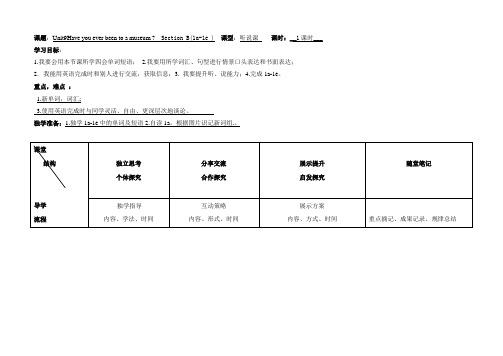
课题:Unit9Have you ever been to a museum ? Section B(1a-1e ) 课型:听说课课时:__1课时___学习目标:1.我要会用本节课所学四会单词短语;2.我要用所学词汇、句型进行情景口头表达和书面表达;2.我能用英语完成时和别人进行交流,获取信息;3. 我要提升听、说能力;4.完成1a-1e。
重点,难点:1.新单词,词汇;3.使用英语完成时与同学灵活、自由、更深层次地谈论。
独学准备:1.独学1a-1e中的单词及短语2.自读1a,根据图片识记新词组.。
当堂测评分层达标一单项选择1. ---Is your friend a teacher or a policeman ---______. He is a lawyer. A. Neither B. All C. Both D. Either2. He has ___ from Singapore for a week. A. got back B. been back C. went back D. come back3.--Where’s your father? --He ___Shanghai. He’ll be back next week. A. has gone to B. has been to C. has been in4. ---How do you like the song Two Butterflies? ---Great! I ___ such a beautiful song before.A. don’t hearB. has never hearC. have never heard5. ---You’ve left the TV on. ---Oh, sorry. I ___and turn it off.A. have goneB. goC. wentD. will go6. ---Will you watch the World Cup match this year? ---No, but I ___ several World Cup matches since I was a small child.A. had seenB. seeC. sawD. have seen7.---Is that Jack speaking? ---Sorry, he isn’t in right now. He ___ the cinema with his aunt.A. has been toB. has gone toC. have gone to8、Both his parents look sad . Maybe they ____what's happened to him .A. knew B. have known C.will know9. The famous writer ___ one new book in the past two year .A. is writing B. has written C.wrote二用have / has been to , have / has gone to 填空①There will be a parents’meeting this afternoon. But my parents can’t come because they ___________to Harbin.②My aunt isn’t here. She _____________ Shanghai on business. She will be back in three days.③Mike ______________ the library, I have to wait for him.④He says he _______________ Dalian several times already this year.⑤.He _______________ here two or three times.【总结反思】______________________________________________________________________________________________________________________________。
英语人教版八年级下册Unit 9 Section(A1a~2d)导学案

Unit 9 Have you ever been to a museum?Section A (1a~2d) 编制人:钟利珍审核人:初二级组课时安排:第1-2课时使用班级:初二级班别:姓名:学号:学习小组:【预学案】一、教学目标:1. 语言知识目标:1) 掌握以下单词、词组:amusement; neither, learn about, lead to ,lead sb. to2)掌握以下句子:Lets' go somewhere different today.Have you ever been to…? Yes, I have./ No, I haven’t.How about/what about…?How are we going to get there?We can take the subway/…3)To train students’ listening,speaking skills二、教学重难点区别have gone to , have been to , have been in的用法一般过去时与现在完成时的用法区别三、学法指导:read ,recite , communicate四、自主学习一)、课前准备1、自学1a到2d, 完成下面的短语1) 太空博物馆2) 游乐场3)水上乐园4)照相机;摄影机;摄像机5)水上城市6)历史博物馆____________________ 7) 不同的地方__________________________8 ) 发明v__________ 发明物n______________ 9)搭建帐篷____________________10 ) 你到过太空站吗?11)琳达从没有到过游乐场。
12 ) 他曾经去过太空博物馆很多次了____________________________________13)我还了解了一些发明,它们成就了彩色电影。
人教版八年级英语下册Unit9导学案

备课人:Su Zhi
learn to do sth. 学做某事
learn sth. by heart 记住
C. Have, been C. was visiting C. has been in C. has been dead C. watched C. have known D. bought D. awake ––_________. C. That’s OK D. to learn D. a moment ago
第 1 页 共物馆). (游乐园).
— He
(去) (不同的地方). (去水上乐园)? (去上班了) (四月底). (搭帐篷)?
(乘地铁).
(invent), they
already
(invent) a lot of useful
take a look (at) 看一看 take a walk 散步
take a rest 休息 take down 取下
八年级英语下册导学案 4. learn 的常见用法 learn about 得知;获悉 四、巩固练习 选择填空 ( )1. — _____ you ever _____ to an aquarium? — Yes, we had a good time there. A. Have, gone ( ( ( ( ( ( ( ( ( ( ( ( A. have visited A. has come to A. has been dying A. has watched A. know A. borrowed A. wake B. Had , been B. visited B. came to B. has died B. was watching B. had known B. lent B. woke C. kept learn from 从…中学习
初中英语人教版八年级下册unit9SectionB1a1d说课稿

一、教材分析
(一)内容概述
本节课的教学内容来自初中英语人教版八年级下册Unit 9 "Hobbies"的Section B 1a-1d部分。在整个课程体系中,本单元旨在帮助学生掌握描述兴趣爱好的基本词汇和句型,提高学生运用英语进行自我介绍和交流的能力。本节课是本单元的核心部分,主要知识点包括:1.词汇:hobby, coin, collection, stamp, postcard等;2.句型:What do you collect? I collect...,Why do you like...? Because...;3.语法:一般现在时态。
2.句型教学:以问答形式呈现新句型,如“What do you collect? I collect...”,引导学生进行角色扮演,互相提问,巩固句型。
3.语法教学:结合实例,讲解一般现在时态的用法,特别是动词形式的变化,让学生在练习中掌握语法知识。
(三)巩固练习
为了帮助学生巩固所学知识并提升应用能力,我计划设计以下巩固练习或实践活动:
3.合理安排课堂时间,尽量让每个学生都能参与练习。
课后,我将通过以下方式评估教学效果:
1.检查学生作业完成情况,了解他们对课堂所学知识的掌握程度;
2.与学生进行交流,了解他们的学习感受和需求;
3.观察学生在下一节课的表现,评估知识迁移情况。
反思和改进措施如下:
1.针对学生的掌握程度,调整教学进度和难度;
三、教学方法与手段
(一)教学策略
在本节课中,我将采用以下主要教学方法:
1.交际式教学法:通过小组讨论、角色扮演等互动活动,让学生在实际语境中运用所学知识,提高他们的语言交际能力。选择这种方法的理论依据是交际语言教学法,认为语言学习的最终目的是为了交际,强调在真实的语境中学习和使用语言。
八年级英语下册教学(人教版,河北专版)Unit9SectionB(1a1d)教学设计
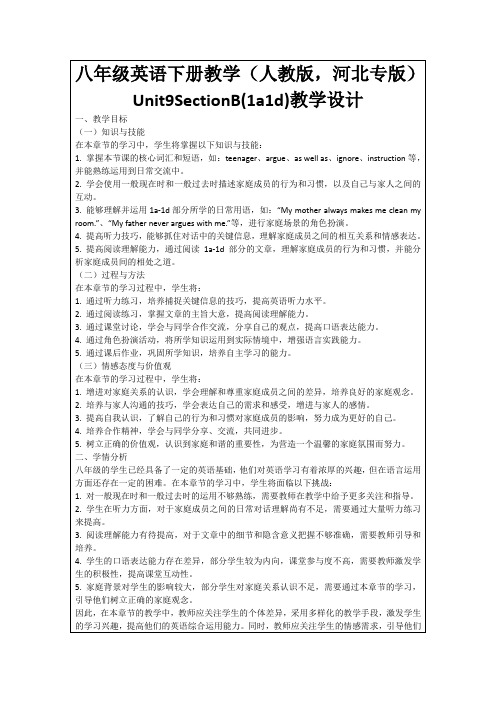
2.学生在听力方面,对于家庭成员之间的日常对话理解尚有不足,需要通过大量听力练习来提高。
3.阅读理解能力有待提高,对于文章中的细节和隐含意义把握不够准确,需要教师引导和培养。
4.学生的口语表达能力存在差异,部分学生较为内向,课堂参与度不高,需要教师激发学生的积极性,提高课堂互动性。
3.教师强调家庭和谐的重要性,鼓励学生努力成为更好的自己,为家庭营造一个温馨的氛围。
4.布置课后作业,巩固所学知识,拓展学生的视野。
五、作业布置
为了巩固本节课所学知识,提高学生的英语综合运用能力,特布置以下作业:
1.完成课本练习册中与本节课相关的练习,包括词汇填空、语法填空、听力练习和阅读理解。
2.根据本节课学习的家庭成员的行为和习惯,用一般现在时和一般过去时编写一段对话,要求不少于五行,涉及至少三个家庭成员。
3.结合所学内容,采访家人,了解他们的日常习惯,并运用所学时态进行描述,以短文形式呈现。
4.观看一部关于家庭生活的英语电影或短片,记录下至少五个生词和五个常用表达,并尝试在课堂上与同学分享。
5.家庭作业:与家人共同完成一个家庭项目,如:做家务、户外活动等,并用手机或相机记录下来,下次课堂上用英语介绍你们的家庭活动。
3.学生进行角色扮演活动,将所学知识运用到实际情境中,增强语言实践能力。
4.教师巡回指导,解答学生在练习过程中遇到的问题。
(五)总结归纳
1.教师引导学生回顾本节课所学内容,总结一般现在时和一般过去时的用法,以及如何描述家庭成员的行为和习惯。
2.学生分享学习心得,讨论如何将所学知识应用到实际生活中,增进与家人的感情。
2.学会使用一般现在时和一般过去时描述家庭成员的行为和习惯,以及自己与家人之间的互动。
初中英语人教版八年级下册unit9SectionB1a1d教学设计
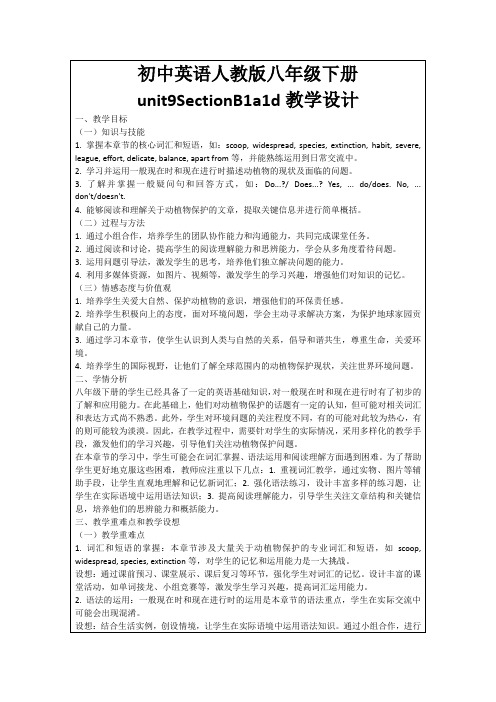
八年级下册的学生已经具备了一定的英语基础知识,对一般现在时和现在进行时有了初步的了解和应用能力。在此基础上,他们对动植物保护的话题有一定的认知,但可能对相关词汇和表达方式尚不熟悉。此外,学生对环境问题的关注程度不同,有的可能对此较为热心,有的则可能较为淡漠。因此,在教学过程中,需要针对学生的实际情况,采用多样化的教学手段,激发他们的学习兴趣,引导他们关注动植物保护问题。
1.教师展示一组关于动植物保护的图片,如北极熊、大熊猫、珊瑚礁等,引导学生观察并思考这些图片背后的共同主题。
2.学生分享观察到的图片信息,教师引导他们总结出“保护动植物”这一主题。
3.教师提出问题:“为什么我们需要保护动植物?动植物保护的重要性是什么?”引发学生对本节课的学习兴趣。
4.学生进行头脑风暴,列举自己了解的动植物保护措施,为接下来的新课学习做好铺垫。
4.教师提问,检查学生对新知识的掌握情况,并对学生的回答进行点评和指导。
(三)学生小组讨论
1.教师将学生分成小组,每组选择一个动植物保护主题进行讨论,如森林砍伐、海洋污染等。
2.学生在小组内部分工合作,查找资料、分析问题、提出解决方案。
3.各小组进行汇报,分享讨论成果,其他小组进行评价和提问。
4.教师对小组讨论进行总结,强调动植物保护的重要性,引导学生关注生活中的环保问题。
2.语法的运用:一般现在时和现在进行时的运用是本章节的语法重点,学生在实际交流中可能会出现混淆。
设想:结合生活实例,创设情境,让学生在实际语境中运用语法知识。通过小组合作,进行角色扮演,互相提问、回答,提高语法的实际运用能力。
3.阅读理解:本章节的文章涉及动植物保护的现状和措施,学生对文章的理解和关键信息的提取可能存在困难。
八下英语 第9单元Unit9 SectionB1a-1d导学案
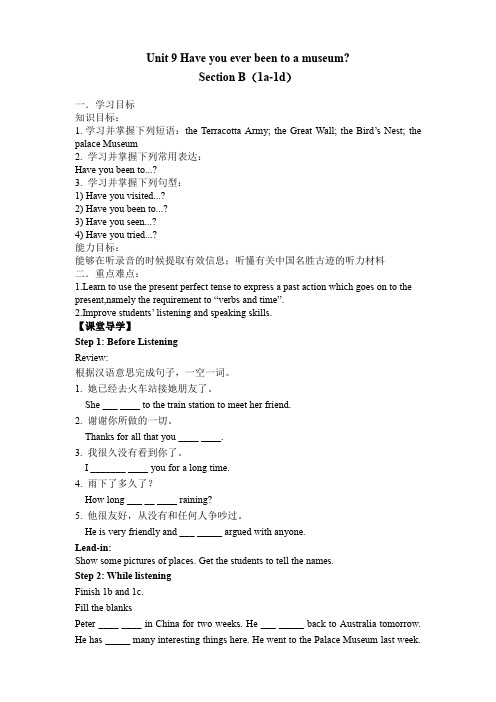
Unit 9 Have you ever been to a museum?Section B(1a-1d)一.学习目标知识目标:1.学习并掌握下列短语:the Terracotta Army; the Great Wall; the Bird’s Nest; the palace Museum2. 学习并掌握下列常用表达:Have you been to...?3. 学习并掌握下列句型:1) Have you visited...?2) Have you been to...?3) Have you seen...?4) Have you tried...?能力目标:能够在听录音的时候提取有效信息;听懂有关中国名胜古迹的听力材料二.重点难点:1.Learn to use the present perfect tense to express a past action which goes on to the present,namely the requirement to “verbs and time”.2.Improve students’ listening and speaking skills.【课堂导学】Step 1: Before ListeningReview:根据汉语意思完成句子,一空一词。
1. 她已经去火车站接她朋友了。
She ___ ____ to the train station to meet her friend.2. 谢谢你所做的一切。
Thanks for all that you ____ ____.3. 我很久没有看到你了。
I _______ ____ you for a long time.4. 雨下了多久了?How long ___ __ ____ raining?5. 他很友好,从没有和任何人争吵过。
He is very friendly and ___ _____ argued with anyone.Lead-in:Show some pictures of places. Get the students to tell the names.Step 2: While listeningFinish 1b and 1c.Fill the blanksPeter ____ ____ in China for two weeks. He ___ _____ back to Australia tomorrow. He has _____ many interesting things here. He went to the Palace Museum last week.There are ____ ____ beautiful ________. He also ___ ____ ___ the Great Wall and the Bird’s Nest. He thinks the Terracotta Army in Xi’an is very ________. He loves _______ _____ very much. His _______ dish is Beijing Duck.Step 3: After listening:阅读听力原文,注意出现的重点单词。
Unit 9 Section B 教案2021-2022学年人教版英语八年级下册
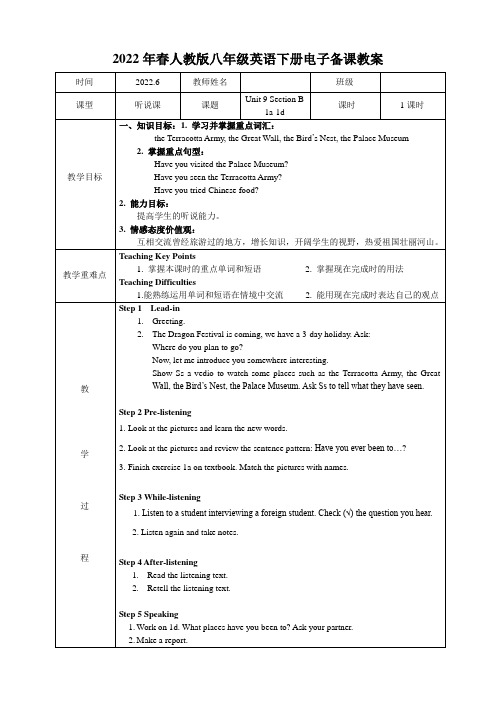
2022年春人教版八年级英语下册电子备课教案时间2022.6 教师姓名班级课型听说课课题Unit 9 Section B1a-1d课时1课时教学目标一、知识目标:1. 学习并掌握重点词汇:the Terracotta Army, the Great Wall, the Bird’s Nest, the Palace Museum2. 掌握重点句型:Have you visited the Palace Museum?Have you seen the Terracotta Army?Have you tried Chinese food?2. 能力目标:提高学生的听说能力。
3. 情感态度价值观:互相交流曾经旅游过的地方,增长知识,开阔学生的视野,热爱祖国壮丽河山。
教学重难点Teaching Key Points1. 掌握本课时的重点单词和短语2. 掌握现在完成时的用法Teaching Difficulties1.能熟练运用单词和短语在情境中交流2. 能用现在完成时表达自己的观点教学过程Step 1 Lead-in1.Greeting.2.The Dragon Festival is coming, we have a 3-day holiday. Ask:Where do you plan to go?Now, let me introduce you somewhere interesting.Show Ss a vedio to watch some places such as the Terracotta Army, the GreatWall, the Bird’s Nest, the Palace Museum. Ask Ss to tell what they have seen.Step 2 Pre-listening1. Look at the pictures and learn the new words.2. Look at the pictures and review the sentence pattern: Have you ever been to…?3. Finish exercise 1a on textbook. Match the pictures with names.Step 3 While-listening1. Listen to a student interviewing a foreign student. Check (√) the question you hear.2. Listen again and take notes.Step 4 After-listening1.Read the listening text.2.Retell the listening text.Step 5 Speaking1.Work on 1d. What places have you been to? Ask your partner.2.Make a report.Write a short passage about your conversation.Step 6 Exercise用所给词的适当形式填空。
初中英语 人教新目标 版八下 Unit 9 Section B 1a-1d 教案
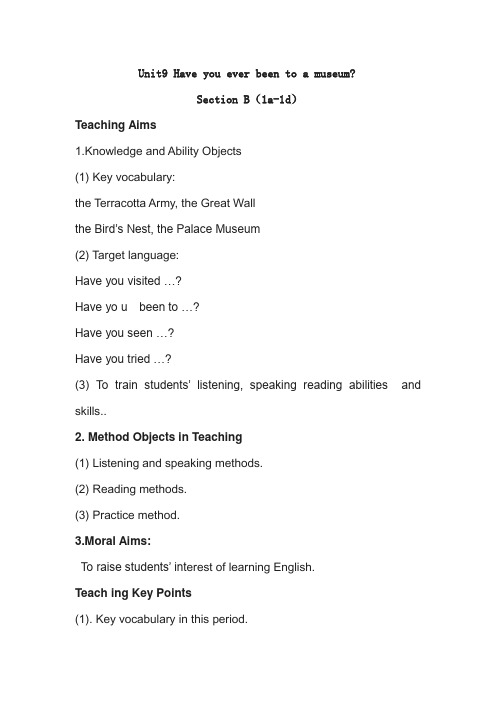
Unit9 Have you ever been to a museum?Section B(1a-1d)Teaching Aims1.Knowledge and Ability Objects(1) Key vocabulary:the Terracotta Army, the Great Wallthe Bird’s Nest, the Palace Museum(2) Target language:Have you visited …?Have yo u been to …?Have you seen …?Have you tried …?(3) To train students’ listening, speaking reading abilities and skills..2. Method Objects in Teaching(1) Listening and speaking methods.(2) Reading methods.(3) Practice method.3.Moral Aims:To raise students’ int erest of learning English.Teach ing Key Points(1). Key vocabulary in this period.(2). Target l anguage in this period.Teaching Difficulties1. Improve students’ listening.2. Improve students’ speaking skills.Teaching Aids1. A computer for multimedia use.2. A tape recorder.Teaching Steps:Step 1 Free talkStep 2 Presentation and practice1.Look at the pictures and review the sent ence pattern: Have you ever been to…?Yes, I have./No, I haven’t.2. Finish exercise 1a on textbook. Match the pictures with names. _________ the Terracotta Army_________ the Great Wall_________ the Bird’s Nest_________ the Palace MuseumKeys: c, a, d, bStep 3 Listening1. Listen to a student interviewing a foreign student. Check (√) the question you hear._______ Have you visited the Palace Museum?_______ Have you been to the Great Wall?_______ Have you been to the Bird’s Nest?_______ Have you seen the Terracotta Army?_______ Have you tried Chinese food?Keys: 1,3, 52. Listen again and take notes.Name: _____________________________________Country: ___________________________________How long in China ________________________Places visited: ____________________________Food: __________________________________Keys: Peter, Australia, two weeks, the Palace Museum, the Great Wall, the Bird’s Nest, the Terracotta Army, Beijing Duck3. Listen again and role_ play the conversation.4. Retell the Peter’s story according to 1c.Step 4 Role-play 1d1.Work in pairs to ask your partner where she/he ha s been to? Have you visit ed …?Have you been to …?Have you seen …?Have you tried …?2.Show time: Act out their conversations.3.Writing: C omplete their conversations.。
- 1、下载文档前请自行甄别文档内容的完整性,平台不提供额外的编辑、内容补充、找答案等附加服务。
- 2、"仅部分预览"的文档,不可在线预览部分如存在完整性等问题,可反馈申请退款(可完整预览的文档不适用该条件!)。
- 3、如文档侵犯您的权益,请联系客服反馈,我们会尽快为您处理(人工客服工作时间:9:00-18:30)。
Section B 1a-1d
【学习目标】
能掌握并灵活运用本课所学的词汇。
【重点难点】
准确地使用现在完成时谈论自己去过的地方
【课前热身】
写作。
用英语写出你曾经去过的一个地方(提示:包括时间、天气、做什么、高兴的事、食物等)
_______________________________________________________ _______________________________________________________ _______________________________________________________
【课堂探究】
一、even的用法
even 意为“甚至”可用于形容词比较级前,表示加强程度,可修饰形容词比较级的词还有:a bit,a little, much, a lot, still, even等
二、wonder的用法意为“想知道,对…感到怀疑”
1、wonder + 特殊疑问句“想知道,好奇”
2、wonder + whether / if从句“想知道是否…”
3、wonder + that从句“诧异,惊奇”
三、辨析be able to与can
1、be able to表示经过努力后获得的能力或能做某事,可用于将来时、完成时和过去时,时态较多。
如:In the end,some of them were able to pass the exam.
2、Can表示能做某事,不强调能力,只用于一般现在时及一般过去时。
如:At home he can do what he wants.
四、辨析with、by、in “用”
1、with,多指使用某种工具或用身体的某个部位或器官来完成某项活动。
如:He cut it open with a knife.
2、by,指采用某种方法、手段,by doing sth.
如:I learn English by asking the teacher for help.
3、In,指使用某种语言、采用某种途径或选用某种材料等
如:Can you sing this song in English?
【当堂检测】
一、用所给词的适当形式填空。
1、He _____ (be) to the History Museum several times.
2、--________ you ever _______ (be) to the zoo?
--Yes, I________(go) there last summer. I ________ (see) many kinds of animals there.
3.—Where is Mr. Wang?
---He ______ (go) to the library. He wants to borrow some library books.
4. Xiao Ming _____ (plant) those trees. He _________ (do) it the day before yesterday.
5. We ______ (learn) English for more than two years.
二、单项选择。
1. How long have you been _____English?
A. study
B. studied
C. studying
D. studyed
2. He called me up when I ______a shower this morning.
A. have
B. had
C. have had
D. was having
3. I think Ann _____a supper star in only 2 years?
A. is
B. is going to
C. is being
D. has been
4. Have you ever ______to travel around?
A. take a train
B. took train
C. by a train
D. by trains
5. The kids from mountains districts _______ never _______ computer games before. They’re so excited.
A. have; played
B. did; play
C. are; playing
D. do; play
6. When I was fifteen years old, I got _____all kinds of stamps.
A. to collect
B. to collecting
C. collect
D. to
7、I want to tell Mike about the thing. But he just ______ it.
A. wasn’t interested
B.wasn’t interested in
C. didn’t interest
D. interested
【教学反思】。
